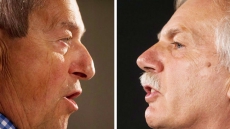TORONTO - A new study out of the Fraser Institute contends that financial bonuses and other incentives for teachers should be based on student achievement if Canadians want to remain competitive on the world stage.
The report from the conservative-leaning, non-partisan think-tank makes the argument that just as other professionals receive performance-based bonuses, so too should teachers who improve student performance.
The report's author, Vicki Alger, said from Vancouver that while Canada gets good grades in overall student performance relative to other countries, it can't afford to rest on its laurels.
Alger noted there are large discrepancies across the provinces and territories, as well as chronic achievement gaps between aboriginal and non-aboriginal students.
And she warned that the current generation will be up against other countries that have developed successful incentive pay programs that are improving student achievement.
"The time to act is now ... the world is only getting more competitive," she said.
Her report points out that public school teacher salaries are currently based on seniority and credentials, which don't have a demonstrable effect on improving student performance.
The study looked at 10 examples of teacher incentive pay programs around the world — including the United States, Europe, South America, Africa, India and Israel. And it found the ones that rewarded teachers primarily or solely based on student achievement were more successful than those that didn't, or failed to clearly define expectations.
Some programs gave teachers annual bonuses as well as higher base pay year after year, while others made ongoing improvements in student achievement the primary condition for moving up the salary scale. The report concluded that in some cases, incentive pay programs were more cost-effective at raising student achievement than increased funding or decreasing class sizes.
To build a successful program, the report says policy-makers must collaborate with teachers on clearly defining what they're expected to do, provide rigorous and customized professional development — which Canada can do because that education policy is determined locally — ensure that all teachers have a fair chance of earning and receiving rewards, and create a culture of continuous improvement for all teachers based on reward for success or consequence for failure.
But governments have to commit to it. Such programs need long term, reliable funding which will encourage teachers to put in the extra effort year after year. The report suggests that funds already earmarked for across-the-board pay increases could be redirected as incentive payments that would become part of a teachers' permanent base pay.
It adds that targeting salary increases towards teachers who raise student achievement would be cost-effective and fair to both taxpayers and teachers as cash-strapped provinces struggle to curb costs amid teacher contract negotiations.
More than 40,000 teachers in British Columbia went on strike in mid-June and delayed the start of the school year for the first time in the province's history, with the government citing wages as a major hurdle in the dispute.
Alger acknowledged that some unions may reject the idea of incentive pay, but she stressed that teachers must have a say for the program to work — noting that when it was imposed in Bolivia student achievement declined.
"I think a balanced policy debate where everyone has an equal voice at the table and student achievement is at least the primary factor, that's your starting point for a successful program," she said.
Some experts were dubious about the purported merits of incentive pay programs.
Wayne Ross, an education professor at the University of British Columbia, said it's based on flawed assumptions, such as extra pay will motivate teachers to work harder. Such schemes have failed in many jurisdictions, he said.
Pay for performance tries to reduce teaching, learning and education "to this simple idea that some external reward is going to change the way people behave, that money is the driving factor," Ross said from Vancouver.
Education isn't like a business, said Annie Kidder of People for Education, an Ontario-based watchdog. Teaching is important, but there are many other factors that contribute to how well students do in school, such as socioeconomic conditions and mental-health issues.
"Canada has quite a successful education system compared to all other systems in the world," she said. "And there's no evidence even looking at the students that are struggling that it's the teaching that's the problem."
Improving classroom learning conditions and ensuring reasonable workloads for teachers would make a big difference in the system, said Dianne Woloschuk, president of the Canadian Teachers' Federation. Woloschuk doesn't believe that money motivates teachers or improves student performance.
"Teachers enter into the profession for more altruistic reasons," she said. "They enter the profession because they want to make a difference in the lives of kids and they want to help children."





